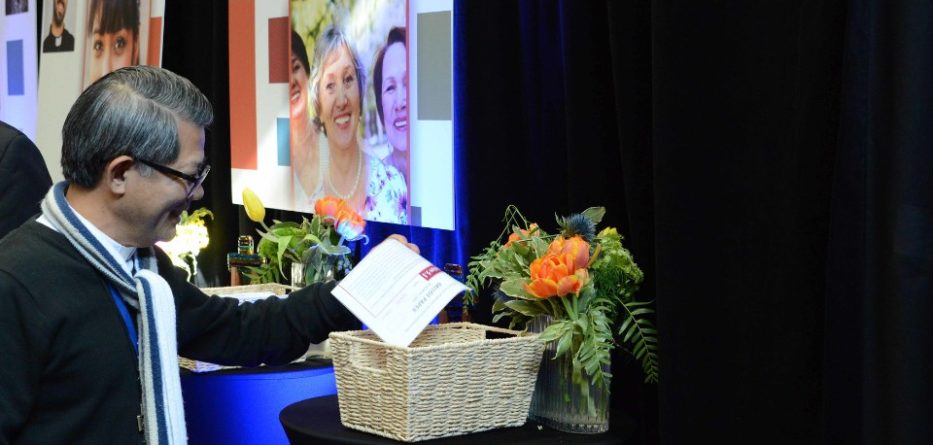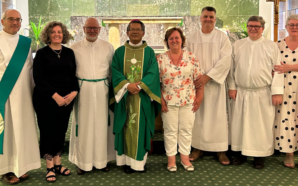Over the holiday break, Catholic Outlook is showcasing some of its most viewed, inspiring and thought-provoking articles from 2022.
The following reflection is from Bishop Vincent Long OFM Conv, Bishop of Parramatta, which was published following the conclusion of the Second Assembly of the Fifth Plenary Council of Australia.
This article was originally published on 17 July 2022.
Most Reverend Vincent Long Van Nguyen OFM Conv DD STL, Bishop of Parramatta
Sixteenth Sunday in Ordinary Year C 2022
Readings: Genesis 18:1-10; Colossians 1:24-28; Luke 10:38-42
Reflection on the Final Assembly of the Plenary Council
Dear friends in Christ,
Last week, nine delegates from our Diocese, including myself, participated as members of the Plenary Council in the Final Assembly in Sydney. This was a historic event in the life of the Church in Australia. We gathered to pray, listen, discern and make decisions, mindful of the voice of the Holy Spirit through God’s Word, tradition, the magisterium and the signs of the times. We were conscious of your communion with us through personal interest, prayers and loving support. As at the first gathering on the feast of St Francis of Assisi, we were stirred by the call issued to us as once to him: “Go and rebuild my Church that is falling into ruins”. We earnestly sought to address the many challenges we face as a community of disciples and map out a better future for the Church going forward.
I am pleased to say that the Plenary Council has been a moment of grace, a celebration of hope and a conviction of God’s enduring accompaniment. Like the disciples with Mary in the Upper Room, we were bonded in one common faith, one baptism and one Lord. Despite our differences, which were many and intense at times, we came together with the best interest of the Church at heart.
Of the many issues discussed, debated and voted upon, the Plenary Council showed strong support for the Uluru Statement from the heart. Catholics have largely been ahead of the general community on First Nations concerns. We have long learned to honour indigenous language, culture, wisdom, sovereignty and way of life. Calling for a First Nations voice to Parliament to be enshrined in Australia’s constitution is indeed a momentous step.
On ecology, there is a recognition of the urgency in addressing the environmental crises of our times and a commitment to join the Laudato Si’ Action Plan. This call to action obliges us not only to care for our common home as a matter of planetary sustainability but also a sense of God-given stewardship. In other words, ecological conversion in all of its manifestations is a deeply spiritual concern arising from our love of God and all of His creation. Our response to the cry of the poor and the cry of the earth is inextricably linked together.
One of the most contentious issues was the motion concerning the equality and dignity of women and men in governance structures, ministry and decision-making mechanisms. The discussion took place at a half-way point and proved to be a pivotal moment. Providentially, the reading for that day was part of the Pentecost story. It read “and suddenly from heaven, there came a sound like the rush of a violent wind and it filled the entire house where they were sitting”. We did not expect a kind of “violent wind” that disrupted, changed the group dynamic and led to a moment of profound revelation.
When the initial motion failed to receive the majority of the deliberative votes, the bishops realized we could not continue business as usual. There were tears, deep sorrow and hurt in the room, especially among those who staged a silent protest. This caught me totally unawares at first but I eventually walked around and shared the pain. Later on, the bishops held crisis talks, agreed on the re-drafting and the assembly passed the re-worked motion.
For some, the protest might have been judged as a stunt and an act of intimidation. For many others, myself included, it was a respectful and powerful gesture of dissent, rooted in the prophetic tradition. The assembly could have walked away with a superficial unity had we not addressed this iconic issue of our time. I believe that the Church cannot have a better future if it persists in the old paradigm of clericalism and male dominance. So long as we continue to exclude women from the Church’s governance structures, decision-making processes and institutional functions, we deprive ourselves of the richness of our full humanity.
I thank God that the Plenary Council had the humility and courage to not go home with a false unity but a deep and new awareness of God’s unfolding revelation and our evolving maturity. At least that is the indication of the majority. The synodal journey can be messy, painful and uncertain. But it can lead to renewed and deepened commitment and even transformation. The mood of the assembly changed after the matter had been dealt with. For many, it was like a paschal moment that brought a ray of hope out of despair.
The Plenary Council was an act of enormous trust, or perhaps in betting terms, a massive gamble. It was an Abrahamic journey from the start. We gambled on the invitation of Pope Francis to be the People of God, walking together, sharing the burdens of humanity, listening to the voice of the most marginalised, reforming its structures and ways of doing things. We did not set out to resolve every question of importance. For instance, on matters of sex and gender, there was very little on the agenda. The acceptance of LGBTIQ+ as the reference to non-binary brothers and sisters was perhaps not a small consensus among the members.
In the end, the significance of this synodal exercise was much more than what was decided. What was highly symbolic and paradigm-shifting was the fact that we met as equals. The emphasis on the superiority of the ordained gave way to an ecclesial communion based on common baptism. Bishops, priests, religious and lay were all addressed by our first names. No one’s voice counted more than another’s. There was a profound sense of being together and working together even if we have distinct roles in the Church.
Dear sisters and brothers,
In today’s Gospel, Martha was occupied with serving her guests, while Mary sat at Jesus’ feet and listened to his teaching. Martha wanted her sister to help with the serving, but Jesus gently informed her that Mary had chosen the better portion, which would not be taken from her. This stance was more radical than modern readers may realize. In Jewish culture, women weren’t allowed to study theology, and the student’s place at a rabbi’s feet was reserved for men only. By welcoming Mary as a pupil, Jesus flipped that cultural script on its head.
There were many other stories of how he treated women with kindness and respect, affirming their value and dignity as those made in the image of God. He welcomed them, defended them, freed and empowered them to find their identity as daughters of God. He included women in his ministry team and welcomed them as disciples, to follow and learn from him – actions unheard of for a Jewish rabbi.
Inspired by the example of Jesus and the guidance of the Holy Spirit on the Plenary Council, may the Church learn to embody a way of being together, sharing responsibility and proclaiming God’s Kingdom. We must continue to embody the alternative relational paradigm that Jesus taught. This counter paradigm turns the world’s system of power structures on its head because it is rooted in the biblical narrative of the new social order of radical inclusion, justice and equality.
All things considered, the Plenary Council has moved decisively towards the vision of Vatican II. I am heartened to say that most of its insights have already been captured by our unique “Parramatta Way”. Women, in particular, are indispensable in our synodal structures and decision-making processes such as the Diocesan Curia. We hope to keep the momentum going and implement all the endorsed decrees. As we move into a new era, may we grow to be a more fit-for-purpose Church, so that we can be a more effective vehicle for the Good News.
May the Holy Spirit “lead the Church in Australia into a hope-filled future, that we may live the joy of the Gospel, through Jesus Christ our Lord, bread for the journey from age to age.”
Amen.








